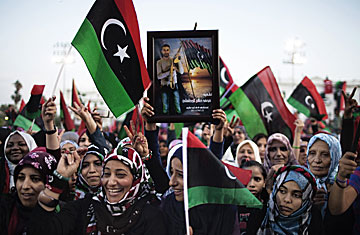
Libyan women celebrate in Tripoli following news of Muammar Gaddafi's capture and death on Oct. 20, 2011
(2 of 2)
On Thursday those legal questions vanished, when Gaddafi was found cowering in a sewage ditch in his birthplace of Sirt. On cell-phone video posted on YouTube and then broadcast worldwide, Gaddafi is seen to be captured alive, surrounded by enraged Libyans hitting him. He then appears to have been dragged to a vehicle and driven away. Jibril told TIME in an interview that evening that Gaddafi was accidentally caught in a fierce firefight between his supporters and fighters of the new regime. "There was cross fire and he was shot while they were carrying him to a truck," he said. Clearly wearying of the ongoing questions, Jibril repeated that version on Sunday to reporters in Jordan, where he has been attending a World Economic Forum meeting. "Have you seen a video of somebody killing him?" he said. "I haven't seen any videotape or mobile film that shows somebody is killing Gaddafi."
On the new Libyan television channel al-Hurra on Saturday evening, two of those who captured Gaddafi gave lengthy accounts of the incident, sticking closely to the official version, as told by Jibril. Clearly overcome with the recollection, one of the young fighters said, "Nobody could believe that he was in there when we got inside" the sewage ditch. "He got out of the sewer like a rat crawling. There was blood all over him, but I didn't focus where it was coming from," he said, adding several times that he felt still "in shock" at the extraordinary moment of having captured the dictator. "It was the first time I had ever seen Gaddafi, and I had my hands on his body, and in that terrible condition."
For many Libyans, the ongoing debate over Gaddafi's death is downright mystifying. Indeed, many are proud of the fighters for having killed Gaddafi — just reward, they believe, for the hell through which he put them. "He was killed by the revolutionaries, they captured him alive, and they killed him," says Ali Ahmed, 21, a business-administration student at the University of Benghazi, who has spent much of the past eight months as a rebel journalist in this city. "I didn't feel sorry," he says, adding, "The idea of human rights is still new in Libya. My friends from America are trying to explain human rights," he says. "They have shown me a copy of the Bill of Rights."
Meanwhile, the country is moving on. The National Transitional Council (NTC) — which has run Libya since the rebels stormed into Tripoli and drove Gaddafi from power in August — on Sunday declared the country liberated in a giant public ceremony in Benghazi, Libya's second biggest city, where the revolt erupted in February. But even as the city's huge square filled with hundreds of thousands of people, the leaders of the NTC — rebels no more — were still holed up in their makeshift quarters in a hotel, scrambling to put together a new interim government. The current council will formally disband within the next few days. Tarhouni, who until February was an economics professor at the University of Washington in Seattle, told TIME he had not yet decided whether to accept the position of Prime Minister, which would last for eight months, until a national council is formed to draft a new constitution and organize the first democratic elections. "It's a huge responsibility," said Tarhouni, admitting that he felt exhausted from the eight-month war.
